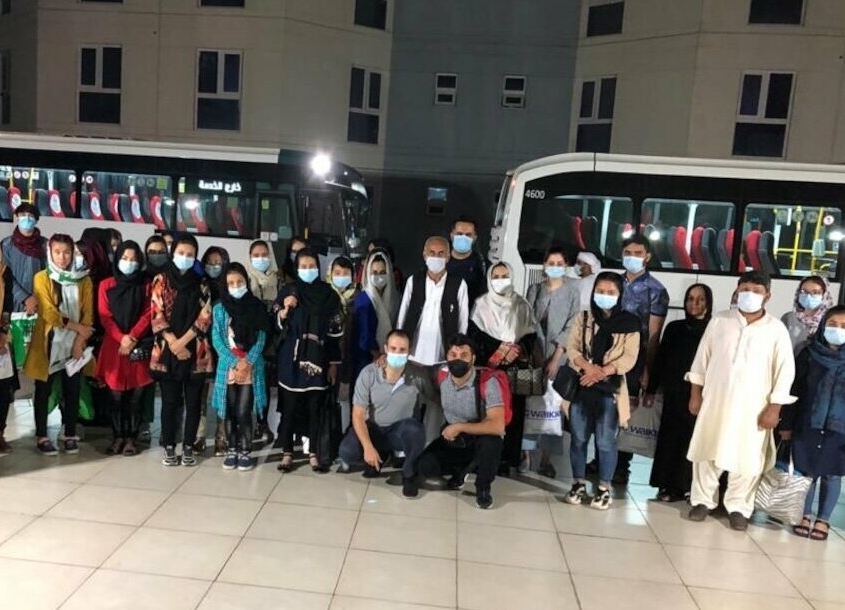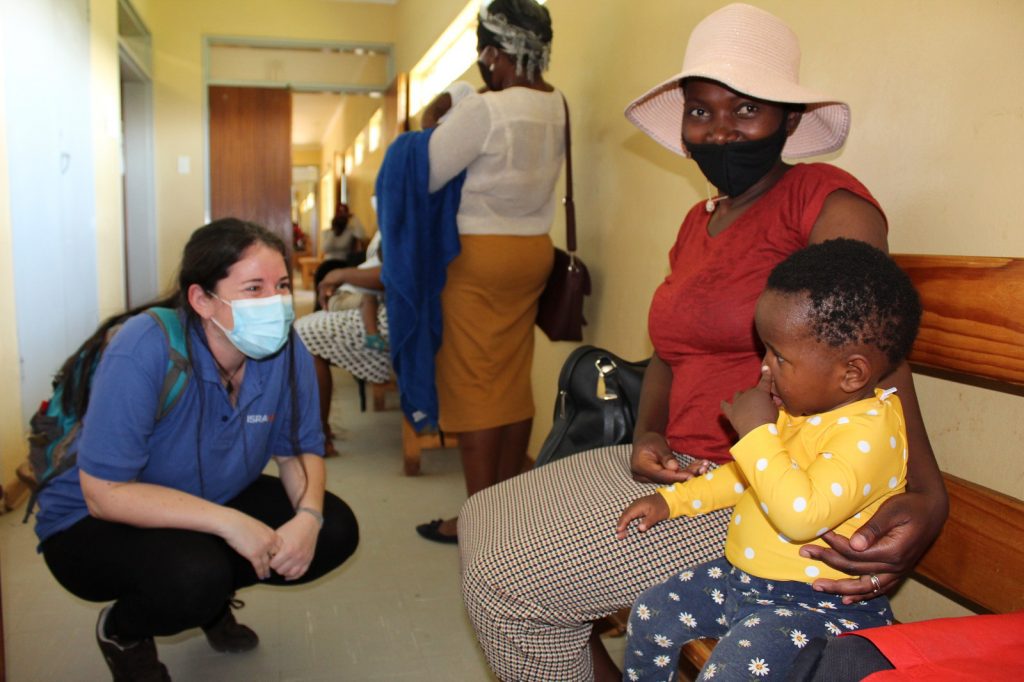IsraAID: Bridge building with Israel through global humanitarian aid
IsraAID: Bridge building with Israel through global humanitarian aid
Ensuring a bright future for Israel is one of the Koret Foundation’s original priorities. Equally important to us has been, and continues to be, inspiring members of the Bay Area Jewish community to pursue a Jewish identity that resonates for them.
Ensuring a bright future for Israel is one of the Koret Foundation’s original priorities. Equally important to us has been, and continues to be, inspiring members of the Bay Area Jewish community to pursue a Jewish identity that resonates for them. Over the years, we have funded many organizations whose work advances both goals simultaneously. For Bay Area Jews, these “engagement experiences” often take place in Israel, but in 2015 Koret began exploring new ways to strengthen the U.S.-Israel relationship through volunteerism and bridge building opportunities.
In 2016, we partnered with IsraAID, now Israel’s largest humanitarian aid organization, to establish IsraAID U.S., with headquarters in the Bay Area. IsraAID’s approach is holistic and optimistic. Teams work continuously in partnership with populations affected by crisis, so the community will recover and build a more resilient future. IsraAID’s program expertise includes: coordinating relief distributions; setting up emergency medical services; providing access to safe water; training governments and service providers in psycho-social support; and re-establishing a sense of daily life in a community. Since its founding in 2001, IsraAID has provided emergency relief services and implemented sustainable development programs in 53 countries around the world.
IsraAID staff provides leadership on missions and in field offices, and the organization relies on Israeli and international volunteers—including doctors, nurses, expressive arts therapists, water engineers, social workers—to supplement their staff teams around the world. IsraAID was drawn to the Bay Area because of its concentration of a diverse pool of potential volunteers and quality educational institutions. As of spring 2020, over 120 professionals from the U.S. have participated on IsraAID missions abroad. IsraAID has also engaged with over 4,000 teens and young adults, and connected with thousands of Bay Area residents through educational and other outreach events.
Koret support also established IsraAID’s Emergency Response Fund, to ensure that IsraAID can respond immediately to international disasters, eliminating the need to secure seed funding before its teams can deploy. As of June 2020, the Emergency Response Fund has enabled IsraAID to deploy immediately in response to 27 emergencies in 22 locations, in addition to responding to the COVID-19 pandemic in 16 countries. The IsraAID U.S. office in the Bay Area also provides support and coordination for disaster response missions in the U.S.
Prepared to respond to a pandemic
In the spring of 2020, IsraAID had teams on 14 missions around the world when the COVID-19 crisis exploded, presenting a “double disaster challenge” for IsraAID. Typically, IsraAID’s model is face-to-face support, even in the most difficult crises, including the Ebola outbreak in Sierra Leone.
The global coronavirus crisis has required IsraAID to use its knowledge and experience to serve communities in different ways. Yotam Polizer, CEO of IsraAID, and mission leaders quickly assessed how to provide the greatest services in response to COVID:
1. Making emergency psycho-social support available to frontline health workers;
2. Promoting hygiene practices in high-risk locations like refugee camps, where a secondary health crisis could flare up;
3. Ensuring that vulnerable communities have access to information, material resources, and psycho-social support;
4. Helping to distribute food and supplies in major-outbreak metropolitan areas like Los Angeles.
These activities have always been part of IsraAID’s work, and so team leaders are well equipped, with the relationships and structures in place to implement quickly. As part of its COVID-19 response, IsraAID is also providing services inside Israel for the first time.
Polizer puts IsraAID’s pandemic response and preparedness in context: “As Israelis, we have personal experience managing the anxiety of living through terror attacks and wars, and as humanitarian professionals we have seen the variety of crises people face in times of trauma. We have a unique approach to fighting the unintended consequences of a global pandemic. By bringing communities around the globe access—to information, to education, to mental health support, and to masks, soap, water, and more—we can help them get through this crisis and prepare for what comes next. And, as with all humanitarian disasters, these are the first steps in a long recovery, and IsraAID will continue to be here in all these locations to provide support for the long term.”
From emergency response to long-term resilience
What sets IsraAID apart from other humanitarian organizations is its commitment to being one of the first responders to a disaster, and then staying for the long haul of recovery to work with the community towards a stronger, more resilient future. Here are a few major examples of IsraAID’s work.
In 2017, after Hurricane Maria devastated Puerto Rico, IsraAID provided emergency medical response, mental health services, and trauma support, including distributing water filters, food, and other relief items. IsraAID spent nearly three years in Puerto Rico supporting the island’s long-term recovery by developing programs in the areas of water supply safety, sanitation, hygiene, and psychological support, culminating in the construction of a large-scale gravity-fed water system in the rural community of El Real, Patillas.
In 2015, as the European refugee crisis reached its peak, IsraAID launched its program on the Greek island of Lesbos, supporting refugees arriving from Syria, Afghanistan, Iraq and North Africa. IsraAID deployed multiple predominantly Arabic-speaking teams to provide immediate aid, medical services, and psychological support, particularly for children. Since 2018, IsraAID has focused on education and integration for refugees on the island, as well as providing integration and community support services for refugees on the Greek mainland. On Lesbos, IsraAID has developed educational frameworks to provide classes for some of the 4,000 refugee children on the island, taught by refugee teachers from the students’ former home communities.
The ongoing work in Greece highlights IsraAID’s unique value as an Israel-based organization working alongside Arab populations. Dr. Iris Adler, an emergency response specialist from Israel, recalls, “There was this one man who needed help due to a wounded leg. When he saw my IsraAID shirt, he told me that three years ago he fought with the rebels in the Golan Heights. During battle he was severely wounded and he came to the border fence with Israel. The IDF (Israeli Defense Force) took him in and he received treatment at Rambam Medical Center. Now, three years later, as he arrived on the beach on Lesbos, the first person he met was me, an Israeli, who was there to help again. He realized the coincidence.”
Yotam Polizer, CEO of IsraAID, elaborates on Dr. Adler’s experience, “Most of our Israeli teams providing urgent care on the Lesbos shoreline spoke fluent Arabic. So, at the height of the refugee crisis in Greece, we could communicate with the newly-arrived refugees in a meaningful way—not just providing medical and psychological support, but also building lasting bonds of trust. This is an added ‘reward’ for us, to learn more about their lives, their situation—and their hopes for the future.”
The Island of Tears from CBN Documentaries on Vimeo.
In 2018, Dr. Adler was also part of IsraAID’s first joint Israel–U.S. medical specialist mission. IsraAID had begun working in Kakuma, Kenya, in 2011, to support both refugees and the host community. Kakuma is the site of a sprawling United Nations-run refugee camp with hundreds of thousands of long-term residents, more than half of them children and teens. Seven years later, IsraAID teams were still working there, and a delegation of pediatricians from the U.S. traveled to Kakuma as volunteers, to support the IsraAID teams. The visiting physicians treated patients in the camp’s two hospitals and six clinics; they also delivered training sessions on pediatric topics for local medical staff. The delegation included Dr. Michelle Sandberg and Dr. Sabrina Braham, both Jewish pediatricians from the San Francisco Bay Area, looking to bridge their professional expertise and their personal values.
Serving as ambassadors of Israel around the globe
IsraAID U.S. has developed educational and engagement programs to raise awareness of the role that IsraAID, as Israel’s leading non-governmental humanitarian aid agency, plays in disaster relief and humanitarian aid work across the globe. The organization continues to expand a suite of programming in the U.S. From 2017–2019, 25 students from leading colleges across the country have taken part in a two-month field placement and year-long engagement program as part of IsraAID U.S.’s humanitarian fellowship initiative. IsraAID U.S.’s educational resources for teens and young adults explore the connections between humanitarian aid and the principles of tikkun olam (repairing the world) and social justice.
Participation in IsraAID’s robust volunteer network by professionals and community leaders is strong. The organization’s speaker’s bureau now includes 35 IsraAID-qualified “champions” — board members, medical and other volunteers, and field observers. Two additional advocacy groups have been formed, the IsraAID Humanitarian Professionals Network (IHPN) and the IsraAID Humanitarian Volunteers Network (IHVN).
Many volunteers from past missions join IsraAID’s speaker’s bureau, motivated to share their stories from the field and to highlight how personally moving it was to volunteer with an Israeli organization. For example, after her return from Kenya, Dr. Sandberg spoke about her experience on numerous occasions, including at the BBYO International Convention in February 2019. She also hosted several speaking events in the Bay Area at both Jewish and secular institutions, connecting her Jewish identity to participating in humanitarian work. She has helped recruit additional Bay Area physicians to IsraAID’s volunteer roster.
Additionally, clergy from across the religious spectrum have participated in IsraAID’s missions and have returned to their congregations and communities to share the stories of refugees. Speaking about their experiences also raises awareness of the importance of humanitarian relief and Israel’s leadership in the field.
As of the end of June 2020, IsraAID had responded to COVID-19 in 16 countries and reached 14 million people through its educational media campaigns, online support, and relief distributions. IsraAID is in the forefront, as well as on the front lines, as the field of global humanitarian aid continues to evolve.
To leverage its expertise, IsraAID has developed an emergency sub-department focused on coordinating and leading emergency responses and early recovery missions. The department has documented mission protocols based on best practices and developed the internal mechanisms needed to readily launch in an emergency. As part of this work, IsraAID is developing methodologies for assessing outcomes, in partnership with Tel Aviv University, to answer the vital question, “How do we measure success on emergency missions?” These criteria and metrics will become key as society is confronted with more natural disasters and new pandemic likelihoods.
Read more
Jewish Peoplehood, U.S.-Israel Bridge Building




